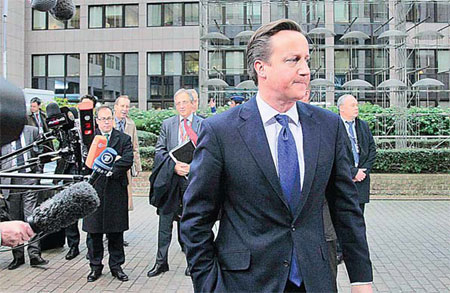Cameron locked in budget battle with Brussels
Updated: 2012-11-24 07:50
By Agence France-Presse in Brussels (China Daily)
|
||||||||
|
Britain's Prime Minister David Cameron speaks to the media as he arrives at the European Union council headquarters for a summit in Brussels on Friday. Yves Herman / Reuters |
British Prime Minister David Cameron was locked in a new battle with Brussels on Friday as angry EU diplomats claimed his "virulent" demands for austerity were blocking a deal on a new budget for the bloc.
Nearly a year after he enraged his European counterparts by vetoing a pact to resolve the eurozone crisis, Cameron on Thursday demanded cuts to the perks enjoyed by so-called "eurocrats".
British officials insisted that other countries, including Sweden, the Netherlands and Germany, largely backed Cameron's position for a reduction in the planned trillion-dollar budget for 2014 to 2020.
In the hours before the summit, there was even talk of a German-British axis of austerity - quickly dubbed "Merkeron" or "Camerkel" after Cameron and German Chancellor Angela Merkel - against France.
But as the summit was suspended overnight, pessimistic European officials said Cameron was hamstrung by the domestic pressures he faces from anti-EU members of his Conservative party.
"The room for maneuver for Mr Cameron is so small that it is likely he will not agree, that's my impression," European Parliament President Martin Schulz said after the initial session lasted just 90 minutes.
One EU diplomat went further, saying that Cameron could be jeopardizing one of his own stated goals - the protection of Britain's cherished 3.6-billion-euro ($4.65 billion) annual rebate from the EU.
"If there is no deal on Friday, it will deprive the British of the victory they had hoped for as far as securing their rebate," the diplomat said on condition of anonymity.
The diplomat said the main obstacle was Cameron's demand for cuts, which have largely divided the bloc between the haves and have-nots.
In December 2011 Cameron found himself isolated in Europe when he deployed Britain's veto of an EU pact to ensure fiscal discipline and tackle its debt crisis.
The move won the Conservatives badly needed support in a country where the EU is widely viewed as a meddling gravy train, but it also had the unwanted effect of strengthening the party's "eurosceptic" wing.
The rebels subjected Cameron to a humiliating parliamentary defeat on the issue of the budget last month, and there were calls for Cameron to emulate 1980s premier Margaret Thatcher, who secured the rebate for Britain.
But while Cameron vowed to use his veto unless the EU agreed to freeze the budget and protect Britain's rebate, he was also engaged in frenetic diplomacy to try and win support in Europe.
Another veto would risk drastically weakening Britain's influence in the EU, which remains the country's biggest trading partner.
Cameron's government meanwhile quietly scaled back its demands, with officials indicating it would settle for a 940-billion-euro spending ceiling, instead of the 886 billion euros it had originally called for.
British officials insisted there was support for Cameron's stance during bilateral meetings on Thursday, including one with Merkel.
"What has been interesting is that we have seen the UK, Sweden, the Netherlands, even Germany, all in quite a firm position wanting to see cuts in this proposal," one diplomat said.
"It's not just Britain that is pushing them, there are other countries that are pushing these cuts as well."
Cameron immediately laid out his plans when he was the first of the 27 EU leaders to meet EU President Herman Van Rompuy on Thursday ahead of the summit.
He suggested cuts worth 6 billion euros, including slashing the pay and benefits of EU officials, such as increasing the retirement age to 68 for some, cutting 10 percent from the pay bill and cutting pensions.
Van Rompuy's proposals for the summit however largely overlooked the British cuts.
"It looks like there's a long way to go until we get the right deal," a dispirited British diplomat said on Friday.
"The figures are now pretty similar to what we had this morning before all those bilaterals took place."

 Relief reaches isolated village
Relief reaches isolated village
 Rainfall poses new threats to quake-hit region
Rainfall poses new threats to quake-hit region
 Funerals begin for Boston bombing victims
Funerals begin for Boston bombing victims
 Quake takeaway from China's Air Force
Quake takeaway from China's Air Force
 Obama celebrates young inventors at science fair
Obama celebrates young inventors at science fair
 Earth Day marked around the world
Earth Day marked around the world
 Volunteer team helping students find sense of normalcy
Volunteer team helping students find sense of normalcy
 Ethnic groups quick to join rescue efforts
Ethnic groups quick to join rescue efforts
Most Viewed
Editor's Picks

|

|

|

|

|

|
Today's Top News
Health new priority for quake zone
Xi meets US top military officer
Japan's boats driven out of Diaoyu
China mulls online shopping legislation
Bird flu death toll rises to 22
Putin appoints new ambassador to China
Japanese ships blocked from Diaoyu Islands
Inspired by Guan, more Chinese pick up golf
US Weekly

|

|







